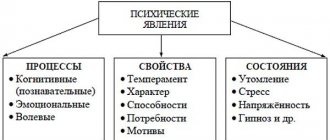Personality is one of the basic psychological categories. It is studied by various sciences, including sociology. But only psychology pays much attention to this topic. In this science, this concept implies the social nature of man.
Many different personalities
What is the difference between the term “personality” and the word “individual”? First of all, its formation is impossible without interaction with other people. This does not mean that human biology is ignored; it is an important component. A person is formed on the basis of biological characteristics that have passed through the prism of sociality. It is possible to understand the essence of this concept only by analyzing the nature of communication. A person is born an individual, and becomes an individual in the process of interaction with other people. A very important concept in psychology is the structure of this social formation.
Formation of personality types in psychology
The division of personalities into types has been practiced for a long time. People are always trying to establish boundaries for scientific concepts and force them into classifications. For such a complex and structural concept as personality, it has still not been possible to select optimal options that fully characterize each person. It is recommended to judge a person based on several types from different classifications.
The most popular options for dividing a person’s personality into types:
- Classification of temperaments according to Hippocrates. Includes 4 categories: sanguine, phlegmatic, melancholic and choleric. It has existed for many centuries, but is still in great demand, as it allows you to make a first impression about a person.
- Characteristics of personality types according to Jung. One of the most optimal classifications, covering 4 personality characteristics at once, which are assessed in antonymous pairs.
- Types of accentuations or psychotypes. These classifications correspond to each other, although they were compiled by different people. It should be noted that the studies assessed individuals who were on the verge of mental illness. Accentuation implies the upper limit of the norm of a particular reaction, which at any moment can jump over the line.
- Socionics. One of the modern classifications based on Jung's research.
Quite a lot of classifications have been created in the 21st century, but none of them went beyond a certain psychological school. Such divisions are not world famous, but they help psychologists navigate specific clinical cases.
Afterword
Despite the fact that most scientists are of the opinion that individuals are made and not born, the question of whether all people are individuals continues to attract controversy and controversial opinions.
- The question of whether a child can be considered a person is controversial, although humanistic pedagogy argues that, undoubtedly, it can and should be.
- The understanding of a mentally ill person or a criminal as an individual is just as controversial.
- Don’t the phrases “asocial personality” or “degraded personality” look ridiculous?
In the end, everyone chooses for themselves which side they belong to in these issues. In my opinion, each person (especially important for young children when raising) can be treated as a potential personality, that is, given a few points head start. However, this is possible until a person proves otherwise.
Human personality types depending on orientation
First of all, the psychological structure of personality implies a person’s orientation towards himself or the outside world. This parameter largely allows us to assume or even determine a person’s reaction in a given situation, thereby typing it according to other classifications.
Introverts
A distinctive feature of introverts is their focus on the inner world. They are characterized by worries and self-doubts. Such people have difficulty contacting the social environment, feel uncomfortable among the crowd, and prefer loneliness to noisy companies. In psychology, there is a direct dependence of personality types on this parameter.
Extroverts
Focus on the outside world is typical for extroverts. Such people not only love to be among people, the social factor is the most important need. Extroverts need contact with individuals and constant communication. They are open emotionally and psychologically, so they easily integrate into society.
In modern society you will not meet people who can be classified as a specific type of orientation. Pure extroverts and introverts are extremely rare and are often not a variant of the norm.
Mental disorders and illnesses
Psychiatry is a developing science that studies the types of mental diseases, the causes of their occurrence and methods of treatment.
The following types of mental disorders and diseases are distinguished:
- schizophrenia and delusional states;
- behavioral and mental disorders associated with the use of alcohol, narcotic and psychoactive substances;
- affective disorders caused by sudden mood swings;
- neurotic, associated with experienced stressful situations and prolonged psycho-emotional stress;
- mental retardation;
- emotional disorders;
- pathologies of mental development that manifest themselves in early childhood and adolescence.
The severity of mental illness is determined individually by examining the patient. During the diagnostic process, the causal factors that influenced the abnormal formation of the psyche are established.
Personality types according to human temperament
The distribution of personality types in psychology always begins with temperament. This parameter has been known since the time of Hippocrates, who first described 4 options for human response. Since then, the definition of temperament has been slightly modernized, but the essence remains the same.
There are 4 types of people depending on their temperament:
- Phlegmatic person. Here the processes of inhibition prevail over reactivity. Phlegmatic people respond heavily to external stimuli, are emotionally stable, and withdrawn. Among the positive qualities, perseverance and high ability to work stand out. Personality orientation – introvert.
- Choleric. In this case, reactivity processes prevail over inhibition. A person tends to overreact to the slightest stimuli. Choleric people have a hard time switching from one thing to another, but they have stable interests. Personality orientation is more extroverted, but depends on the specific case.
- Sanguine. There is a balance in the processes of reactivity and inhibition, so a person reacts vividly to positive and negative factors. Sanguine people are emotionally open, active and resourceful, and at the right moment they know how to restrain themselves. Personality orientation – extrovert.
- Melancholic. Among all human personality variants, melancholic people have the least reactivity, but excessively high sensitivity. The combination of these qualities leads to a painful perception of minimal stimuli. The performance of melancholic people is reduced, and perseverance is minimal. They tend to doubt themselves and give up on things they have started. Personality orientation – introvert.
Child psyche
The distinctive features of the child’s psyche are that at different stages of the child’s development its structural components are formed.
The quality and state of health of the child’s psyche directly depends on the conditions in which upbringing takes place, what methods are used, and whether the child receives preschool education, good nutrition and the care of loved ones.
The formation of a child’s psyche occurs through the emergence of internal and social crises, which manifest themselves as they reach a certain age.
Types of personality types according to Jung
The famous psychologist C. G. Jung developed one of the most accurate classifications of human personality, which is still used by most psychologists and psychiatrists. His approach involves assessing an individual according to 8 characteristics, which are arranged in pairs with opposite meanings. For example, one of the classification points is to determine a person’s extraversion or introversion. Another 6 criteria are combined as follows: irrationality and rationality, ethics and logic, intuition and sensory. By determining the psychological structure of a particular person, experts find out the person’s proximity to one of the parameters of the couple, and after that they leave a complete picture of the individual’s psyche.
Irrationality and rationality
Irrationals perceive reality only after the fact, without thinking about the past or future. They quickly adapt to environmental changes and make decisions based on current facts rather than experience. Such people know how to get out of unexpected difficult situations by activating their brain activity and quickly finding the right solution.
Personality types such as rationals are people who rely on solid life principles, experience, successes and failures of other people. This behavior causes the slowness of adaptation of rationals to changed conditions. However, in a stable environment, they are able to quickly make a decision and give a response to the situation, since they do not continuously analyze events, but use a ready-made reaction pattern. Rationalists can develop their thinking speed with the help of special BrainApps games.
Logic and ethics
One of the personality options of a modern person is an ethicist. Individuals of this type adhere to established dogmas and moral principles. They tend to be expressive in everyday speech, embellishing reality.
Logicians assess the situation objectively, focusing on facts. They evaluate each case separately, rather than choosing a solution that is typical for all options. Ethics among logicians is not well developed, which is why people of these types interact poorly with each other.
Sensory and intuition
The intuitive perception of reality is quite weak. Such individuals are prone to absent-mindedness and uncertainty. They constantly hover in the past, make assumptions about the future, but they are not enough for the present. Special articles on the BraonApps blog will help improve your ability to fully perceive the surrounding reality, and improving your attention can be achieved by playing simple and interesting games.
People of the sensory type perceive reality in the present, therefore they live by sensations. They clearly perceive themselves and are more deeply imbued with the world around them. Their sensitivity is directed not only to mental matters, but also to physiological needs.
Scientific interpretation
The psyche in psychology is an individual property of the human body, which consists in the ability to independently perceive the world around us, construct an objective reality, as well as regulate one’s behavior and activities.
From a scientific point of view, the psyche is characterized by the presence of basic qualities in the form of integrity, psycho-emotional activity, desire for development and knowledge of the world around us, self-regulation of one’s actions, communication with other highly organized beings, and the ability to quickly adapt to new conditions.
The independent science of psychology studies the psyche and the processes it covers.
Types of accentuations or psychotypes
In psychology, psychotypical concepts of personality are widely used, which to some extent indicate the presence of borderline deviations. Every person has an accentuation, which is developed to one degree or another and at any moment can develop into a serious problem.
The following types of accentuations in people are distinguished:
- Cycloid type (biphasic or cyclical mood swings from bad to good, instability of interests)
- Labile personality type (quick and uncontrollable mood changes, which in psychology are called rapid switching; even the person himself cannot predict changes in emotions);
- Asthenic type (a closed and serious person with a characteristic asthenic appearance, distinguished by stubbornness and poor adaptation to changing conditions);
- Sensitive option (high demands on oneself and others, impressionability and increased susceptibility);
- Psychasthenic personality type (distinguished by increased emotional rejection of responsibility; in psychology they are noted as reliable and reasonable people);
- Schizoid variant (in the first place is non-standard thinking, but its consistency is practically absent);
- Conformal type (they completely adapt to their environment and hate change);
- Unsustainable option (rejection of work activity with a craving for an idle existence without control);
- Hysteroid (requires increased attention to oneself, which is why he is prone to demonstrative behavior);
- Epileptoid type (restrained personality with outbursts of anger, loves clarity and certainty in everything);
- Hyperthymic (stable positive mood, openness and high energy).
The personality psychology of each person is a complex, branched structure. Even highly qualified specialists will not be able to identify all its branches. Insufficient understanding of how the brain works causes the continuous emergence of new theories and classifications, which positively prove themselves in practice until the first case that cannot be typed.
Mental processes
The psyche in psychology is an integral structured system, the elements of which are mental processes. The latter are a group of daily events that are united according to functionality.
The following types of mental processes are distinguished:
- imagination;
- thinking;
- speech activity;
- Feel;
- physiological reflection;
- emotions;
- being under stress;
- affect;
- setting and pursuing a given goal;
- making an independent decision;
- doubts about choice;
- struggle of motives;
- concentration of attention;
- ability to remember information.
Unlike other structural elements of the psyche, the above processes are present in human life every day. The most in demand are mental processes of the cognitive type associated with the thought process, communication with other people, concentration, and the work of the imagination.
Features of the term
The attitude component described in this article refers to the beliefs, thoughts, and attributes that we associate with an object. The cognitive component is the segment of opinions or beliefs. It refers to that part of the attitude that is associated with a person's general knowledge.
Typically, it is found in generalities or stereotypes such as “all children are cute”, “smoking is bad for health”, etc.
Behavioral component
The behavioral component of a social attitude indicates the tendency to respond to the object of the attitude in a certain way. It compensates for the partial deficiency of the cognitive component.
In other words, it is a predisposition to act in a certain way towards an object of attitude. It becomes known by observing a person's behavior, that is, what he says, what he will do, or how he behaves, does or reacts.
For example, the stakeholder in the above case may decide to take up a job because of good future prospects.
Of the three attitude components, only the behavioral component can be directly observed. The other two components of attitude cannot be observed: beliefs (cognitive component) and feelings (affective component).
Research
Research into attitudes as a phenomenon has often focused specifically on the cognitive component. Contemporary thinking regarding childhood pathology emphasizes the need to view psychopathology from a developmental perspective. Cicchetti and Schneider-Rosen, for example, argue that psychopathology in children should be viewed in terms of a failure to negotiate important tasks of social-cognitive competence in the developmental sequence of childhood. Mastery of stage tasks is seen as the mechanism by which children move to new levels of cognitive organization and differentiation.
Cognitive reorganization is viewed as the process by which previous levels of organization are incorporated into new hierarchies of cognitive structure. Thus, failure to agree on a single developmental task has implications for mastery of subsequent stages and hence consequences for subsequent social-cognitive competence in adulthood. The cognitive component, the behavioral component - components of this kind play a very important role in all social processes, which has been repeatedly confirmed by many studies.











